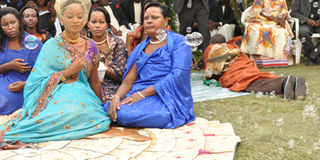Senga’s advice: Is it all useless?

Tooro’s Princess Ruth Komuntale (L) at her traditional wedding ceremony, with her aunt . Photo by Rachel Mabala.
What you need to know:
The debate on the relevancy of the paternal aunt draws subjective views. Even more, the advice this Senga dispenses, especially the traditional one. But how much of this information could actually improve sex lives and save marriages? Stella Nakakande explores.
In African culture, or should I say Ugandan culture, when a child became an adolescent, it was time to prepare them for their future roles as spouses and home owners/makers. For this purpose, the girls were sent off to their paternal aunts (sengas) and boys their maternal uncles (kojjas).
Things have changed over the years. For many reasons, many new-age wives, husbands and parents no longer benefit from this sort of arrangement. Heck, some even barely know members of their distended families, let alone conform to traditional norms such as their traditional roles as wives or husbands.
For those that still crave the tradition, however, the solution has been found in commercial sengas. And these sengas do have quite the advice! The biggest debate has been whether it should be taken to heart, sieved accordingly, or ignored altogether.
The tips the Senga gives
Justine Nantume is one of the many sengas on the market. She explains that first and foremost, every female should “visit the bush”. This is the act of act of elongating the inner lips in the vagina by pulling at them over time with local herbs. Done especially among the central tribes in Uganda during a girl’s teenage years under the guidance of their paternal aunts, this, according to Senga Nantume, helps retain a woman’s warmth. “A woman who has not visited the bush takes in a lot of air because of the many openings they have unlike men.”
It is not only a traditional practice but crucial to one’s marriage. “A man will respect you for having visited the bush,” and this is something that all three sengas I talked to agree on.
“Women have to be clean,” Senga Phina Nantaba of Masaka explains. One is always new towards their husband. Nantaba explains that a woman should take a bath very early in the evening with, preferably, cold water. This is so she has warmed up again by the time she gets to bed.
On this issue, Senga Nantume explains that if and when women are in their menses, they should let their husbands know very early in the day, say with a text message, so that a man is not expectant. “Some women choose to keep quiet and lead their men on,” she explains. “This should never happen. And a man should never see one’s pad or blood.”
The same sengas agree on the fact that a woman should have a bedroom towel, what the Baganda call enkumbi, for the purpose of cleansing in the aftermath of intercourse. “A man should never be left to go to the bathroom to take a bath. It is a sign of respect,” says Nantaba, explaining that it allows for the man to go to the bathroom later when he is well rested. It also gets back to the issue of cleanliness, otherwise one will be left washing stained bed-sheets on a daily basis. Apparently, it also affects the man’s potency.
“In addition, women do not know how to lie in bed, they end up taking in a lot of air,” complains one senga. A woman’s legs should always be together.
And then comes the “noise” that should follow during sex, which according to Senga Nantume, is a skill many lack. An older senga further advises: “Some women simply lie on the bed during sex. If you do not want, it is best to say it at the start, or you have to show interest.”
None of them is, however, willing to explain how exactly one is supposed to moan although they all explain one should not just shout. She maintains it is ultimately important to know what your man wants.




